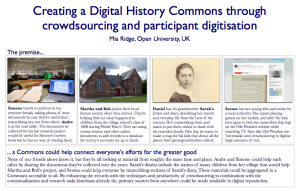I was asked to share some of the lessons I've learnt from building digital participation projects in museums and from my research on crowdsourcing in cultural heritage for the London Museums Group blog following my talk at their “Museums and Social Media” event on 24 May at Tate Britain.
They were published at 'Tips for digital participation, engagement and crowdsourcing in museums by Mia Ridge', but as the site doesn't seem to be loading I've re-posted it below. I think most of what I wrote then holds up, but today I'd add a third bonus tip – plan to ingest the results of your crowdsourcing tasks into whatever internal systems are necessary to appropriately integrate and re-share the enhanced or new data.
To pinch from my headings, I discuss the advantages of digital engagement; challenges for museums – new relationships, new authorities, dissolving boundaries; 6 tips for designing digital participation experiences in museums; 2 bonus tips for designing crowdsourcing projects in museums.
There are other event reports at A round up of the LMG Museums and Social Media Event.
If you found this post useful, you might be interested in my book, Crowdsourcing Our Cultural Heritage.
Continue reading "Guest post 'Tips for digital participation, engagement and crowdsourcing in museums' for London Museums Group"

